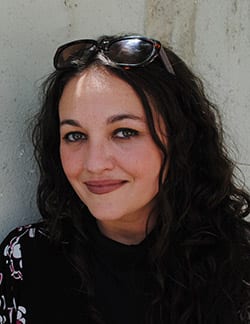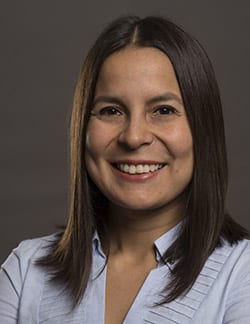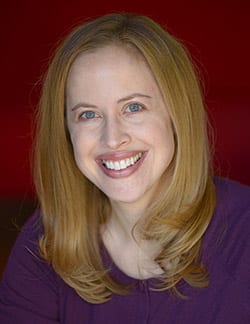By Andrew Cohen
For three Berkeley Law students who were Human Rights Center (HRC) fellows last summer, presenting their work at the center’s annual Fellowship Conference offered a chance to relive some transformative moments.
Andrea Trewinnard ’19, Nathalie Alegre ’19, and Sarah Lakhani ’19 spoke glowingly about their experience and candidly described some of the difficult challenges they encountered. They were among 14 UC students who served as fellows, and gave TED-style talks in Berkeley Law’s Goldberg Room about striving to uphold human rights in Brazil, India, Mexico, Mongolia, Peru, Syria, Turkey, and the United States.
“This fellowship program is the heart of all the work we’ve done,” said HRC Executive Director Alexa Koenig ’13. “Since the program launched in 1994, we’ve had more than 300 students serve around the world.”
Preserving video evidence

Working in the field of Arabic and modern Middle Eastern studies before law school, Trewinnard was in Egypt during the start of the Arab Spring in 2011. She saw how social media platforms played a huge role in documenting human rights abuses, and wanted to join that effort.
She did so at HRC’s Human Rights Investigations Lab, and then during her fellowship at the Syrian Archive in Berlin. There, she investigated and preserved YouTube videos showing human rights violations and crimes committed during the Syrian conflict.
“I was moved by the idea that such a small team of people could have the insight and audacity to repurpose technology to preserve possible evidence of war crimes—and prevent some of the most powerful authoritarians from erasing the history of this conflict,” she said.
Trewinnard helped produce a report about eight attacks on hospitals and clinics that occurred in April. Her team examined visual content using satellite imagery and combined its findings with witness statements.
Just days before the report’s scheduled release, however, Trewinnard “experienced the most shocking moment of my fellowship,” when thousands of videos of the conflict “suddenly disappeared from YouTube. In July alone, over 100,000 were removed in systematic takedowns.”
Reportedly seeking to erase extremist propaganda from its platform, YouTube inadvertently removed videos that could be used to document atrocities—possibly jeopardizing future war crimes prosecutions. The company had implemented new technology to automatically flag and remove content that potentially breached its guidelines.
Trewinnard said it was “heartbreaking to listen to the voices of the people in Syria speaking in the immediate aftermath of the removals, particularly as they discussed what seemed like impossible bureaucratic hurdles to contacting the responsible parties at YouTube. These people risk their lives to capture war crimes, and their work was so carelessly and systematically deleted.”
Some videos were reinstated after their creators notified YouTube, however, and Trewinnard remains committed to preserving online evidence. “Even in such a dark conflict, I find tremendous light and hope in the work of the Syrian Archive,” she said.
Can a river have rights?
Alegre worked as a legal intern in the Amazon Program offices of EarthRights International (ERI) in her native Lima, Peru. She conducted research to protect environmental defenders criminalized by police, and educated local community members about their rights regarding projects that extract natural resources.

Her fellowship focused on the Marañón River, the second largest river in Peru, and whether it could be granted legal rights. In 2011, Alegre said Peru’s outgoing president announced plans to build 20 dams across the river based on a 30-year-old study. “Although gaffes in the plan were subsequently found, the government is still looking to move forward with this plan, which would displace thousands of families and threaten the river’s ecosystem,” she lamented.
During her first year of law school, Alegre learned that the law often “is static, must follow precedent, and isn’t amenable to creative argument.” So when asked to research whether Peru could grant personhood to the Marañón, she was “pretty skeptical.”
To her pleasant surprise, Alegre discovered legal doctrines and cases supporting that argument. She found recent decisions by judges in Colombia, New Zealand, and India imbuing natural resources with rights, and used them to bolster arguments for ERI’s outreach with Peruvian policymakers.
In Colombia, a tribunal ruled that a river polluted by mercury through illegal mining had a right to be protected. Two guardians, one appointed by the president and another elected by the local community, and a team of advisors were tasked with preserving the river’s health.
“Our river in Peru supports human, plant, and animal life,” Alegre said. “My work there has helped me approach the ideal of legal expansion more optimistically.”
Protecting immigrant business owners
Lakhani worked closer to home, with the Lawyers’ Committee for Civil Rights in San Francisco, on a far-reaching project: protecting immigrant business owners.

“There’s plenty of misunderstandings about immigration law, especially with regard to this group,” she said. “Many think immigrant business owners should not incorporate or formalize their business because they’ll further identify themselves to immigration authorities. In reality, that’s okay to do in consultation with lawyers. We’re trying to help people create businesses that will last if they’re detained or deported.”
Lakhani recalled the aftermath of Pearl Harbor, when roughly 122,000 Japanese-Americans were given “a week to pack their belongings before being indefinitely detained and most lost their homes, business, and savings.” Today, Lakhani said the U.S. government is detaining more than 4,000 immigrants.
“Many have been in the country for decades and own popular local businesses,” she said. “They’re detained technically for non-punitive purposes, and await the conclusion of drawn out removal proceedings that determine whether they can stay in the U.S. Many are found eligible to return—but will they find their business still intact?”
Working with Berkeley Law graduate Sushi Jacob ’11, Lakhani and her colleagues helped immigrants formalize their businesses and create contingency plans to secure assets in case of deportation or detention.
“We prepared a guide for lawyers who want to assist this effort pro bono,” she said. “Immigrants launch more than one-fourth of U.S. businesses and employ nearly 6 million workers. Immigrant entrepreneurship is something we should be proud of and protect.”